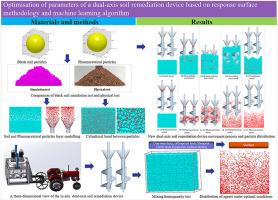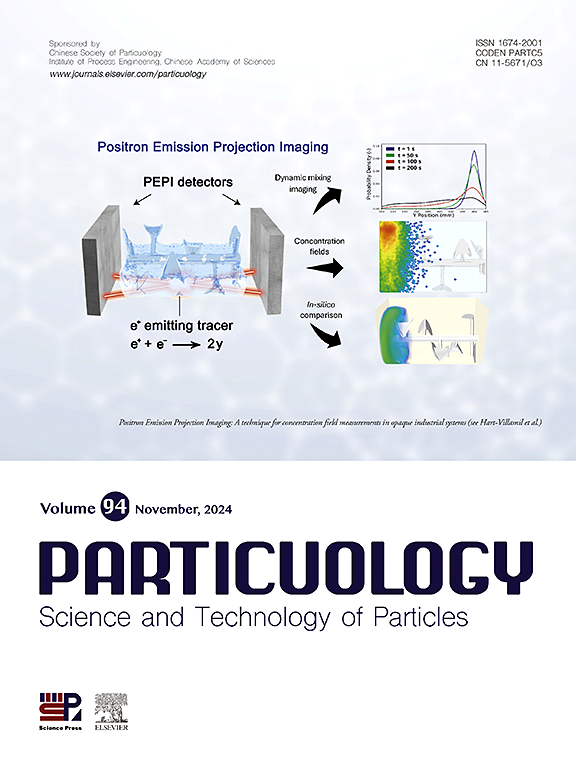Optimisation of parameters of a dual-axis soil remediation device based on response surface methodology and machine learning algorithm
IF 4.1
2区 材料科学
Q2 ENGINEERING, CHEMICAL
引用次数: 0
Abstract
To accelerate the recycling of black soil, it is necessary to develop a new type of soil remediation equipment to improve its working efficiency. The one-way test was used to determine the mean level value of the steepest climb test, and the combined equilibrium method was used to determine the upper and lower interval levels of the response surface test for parameter optimisation. Based on the results of the response surface indices, machine learning was performed and the optimal model was determined. The results show that the predictive ability and stability of the decision tree model for the two indicators are better than that of random forest and support vector machine. The optimal parameter combinations determined using the decision tree model are: speed 73 rpm, homogenisation pitch 183 mm, homogenisation time 1 s, descent speed 0.06 m/s. The error between the optimal value of the machine learning prediction model and the actual simulation is 1.1% and 5.72%, respectively. The results of the study show that the effect of optimizing the parameters through machine learning achieves a satisfactory prediction accuracy.

基于响应面方法和机器学习算法的双轴土壤修复装置参数优化
为了加快黑土的循环利用,有必要开发一种新型的土壤修复设备,以提高其工作效率。采用单向试验确定最陡爬坡试验的平均水平值,采用组合平衡法确定响应面试验的上、下区间水平,进行参数优化。根据响应面指数的结果,进行机器学习并确定最优模型。结果表明,决策树模型对两个指标的预测能力和稳定性均优于随机森林和支持向量机。利用决策树模型确定的最佳参数组合为:转速 73 rpm、均质间距 183 mm、均质时间 1 s、下降速度 0.06 m/s。机器学习预测模型的最优值与实际模拟值之间的误差分别为 1.1%和 5.72%。研究结果表明,通过机器学习优化参数的效果达到了令人满意的预测精度。
本文章由计算机程序翻译,如有差异,请以英文原文为准。
求助全文
约1分钟内获得全文
求助全文
来源期刊

Particuology
工程技术-材料科学:综合
CiteScore
6.70
自引率
2.90%
发文量
1730
审稿时长
32 days
期刊介绍:
The word ‘particuology’ was coined to parallel the discipline for the science and technology of particles.
Particuology is an interdisciplinary journal that publishes frontier research articles and critical reviews on the discovery, formulation and engineering of particulate materials, processes and systems. It especially welcomes contributions utilising advanced theoretical, modelling and measurement methods to enable the discovery and creation of new particulate materials, and the manufacturing of functional particulate-based products, such as sensors.
Papers are handled by Thematic Editors who oversee contributions from specific subject fields. These fields are classified into: Particle Synthesis and Modification; Particle Characterization and Measurement; Granular Systems and Bulk Solids Technology; Fluidization and Particle-Fluid Systems; Aerosols; and Applications of Particle Technology.
Key topics concerning the creation and processing of particulates include:
-Modelling and simulation of particle formation, collective behaviour of particles and systems for particle production over a broad spectrum of length scales
-Mining of experimental data for particle synthesis and surface properties to facilitate the creation of new materials and processes
-Particle design and preparation including controlled response and sensing functionalities in formation, delivery systems and biological systems, etc.
-Experimental and computational methods for visualization and analysis of particulate system.
These topics are broadly relevant to the production of materials, pharmaceuticals and food, and to the conversion of energy resources to fuels and protection of the environment.
 求助内容:
求助内容: 应助结果提醒方式:
应助结果提醒方式:


